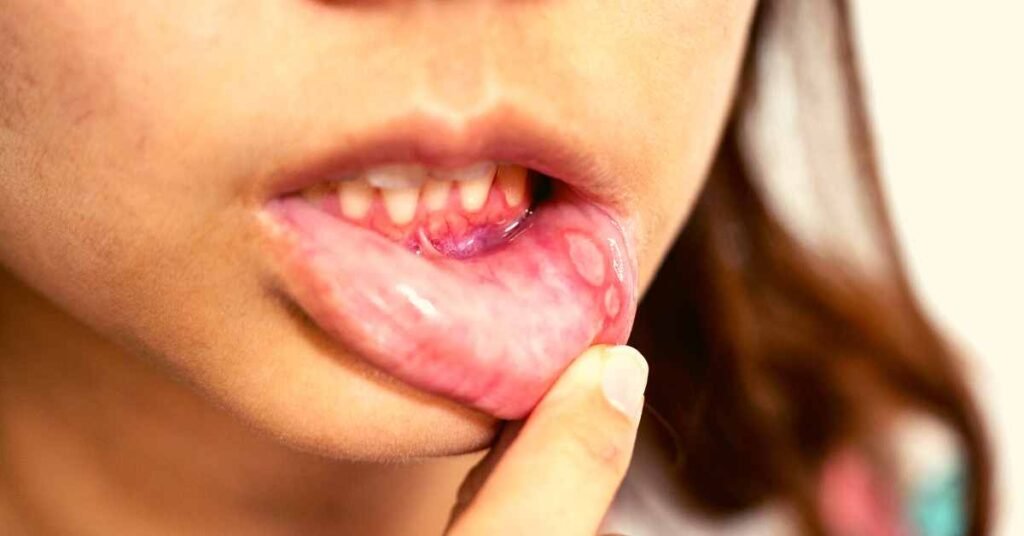Mouth ulcers, or canker sores, are a common and often painful ailment that can interfere with daily activities such as eating and speaking.
While there are various over-the-counter treatments available, many individuals seek natural remedies to alleviate the discomfort associated with mouth ulcers.
One such natural remedy is the consumption of soothing teas and tisanes, which have been cherished for their therapeutic properties for centuries.
In this article, we will explore the benefits of different teas and tisanes in managing and soothing mouth ulcers.
Understanding Mouth Ulcers

Mouth ulcers are small, painful sores that can develop on the gums, inside of the cheeks, or on the tongue.
These ulcers can result from a variety of factors, including stress, nutritional deficiencies, hormonal changes, or underlying health conditions.
While they are typically harmless and tend to heal on their own, the pain and discomfort they cause can be a significant hindrance to daily life.
Teas and tisanes, derived from various plants and herbs, have long been recognized for their potential therapeutic effects.
From anti-inflammatory properties to immune-boosting benefits, certain teas can offer relief and aid in the healing process for mouth ulcers.
Chamomile Tea
Chamomile tea, derived from the dried flowers of the chamomile plant, is renowned for its calming and anti-inflammatory properties.
The active compounds in chamomile, such as chamazulene and bisabolol, possess anti-inflammatory and antimicrobial effects, making chamomile tea an excellent choice for soothing mouth ulcers.
Brew a cup of chamomile tea and allow it to cool to a comfortable temperature.
Gargle the tea in your mouth for a minute or two before swallowing.

This process can be repeated several times throughout the day for relief.
Additionally, chamomile tea bags can be applied directly to the affected area for a localized soothing effect.
Peppermint Tea
Peppermint tea, derived from the leaves of the peppermint plant, is known for its refreshing taste and medicinal properties.
The menthol in peppermint has a cooling effect that can help alleviate the pain associated with mouth ulcers.
Peppermint tea also possesses mild numbing properties, providing temporary relief from discomfort.
Brew a cup of peppermint tea and let it cool before rinsing your mouth with it. Swish the tea around your mouth for a minute or two before spitting it out.
This process can be repeated multiple times throughout the day. However, individuals with gastroesophageal reflux disease (GERD) should use peppermint with caution, as it may exacerbate symptoms.
Licorice Root Tea
Licorice root tea, made from the dried roots of the licorice plant, has been used in traditional medicine for its anti-inflammatory and soothing properties.
The glycyrrhizic acid in licorice root exhibits anti-inflammatory effects, making it a potential remedy for mouth ulcers.
Brew licorice root tea and allow it to cool before using it as a mouth rinse.
Gargle the tea for around 30 seconds before spitting it out.

This process can be repeated several times a day.
However, it’s important to note that excessive consumption of licorice can lead to side effects, so moderation is key.
Sage Tea
Sage tea, derived from the leaves of the sage plant, possesses anti-inflammatory and antimicrobial properties that can aid in the healing of mouth ulcers.
Sage has been traditionally used to alleviate various oral conditions, making it a valuable addition to the list of teas for mouth ulcer relief.
Prepare sage tea by steeping fresh or dried sage leaves in hot water. After the tea has cooled, use it as a mouth rinse by swishing it around for a minute before spitting it out.
This process can be repeated multiple times throughout the day for relief.
Green Tea
Green tea, rich in antioxidants and anti-inflammatory compounds, has been associated with numerous health benefits.
Epigallocatechin gallate (EGCG), a polyphenol found in green tea, exhibits anti-inflammatory and antimicrobial effects, potentially aiding in the management of mouth ulcers.
Brew a cup of green tea and allow it to cool before using it as a mouth rinse.
Gargle with the tea for about a minute before spitting it out.

Green tea can be consumed regularly as a part of your daily routine to promote overall oral health and potentially reduce the frequency of mouth ulcers.
Marshmallow Root Tea
Marshmallow root tea, made from the dried roots of the marshmallow plant, is known for its mucilage content.
Mucilage is a gel-like substance that can coat and soothe irritated tissues. This makes marshmallow root tea a potentially effective remedy for easing the discomfort associated with mouth ulcers.
Prepare marshmallow root tea by steeping the dried roots in hot water.
After the tea has cooled, use it as a mouth rinse by swishing it around for a minute before spitting it out. Repeat this process several times a day for relief.
Final Word
Teas and tisanes have been cherished for their healing properties for centuries, offering a natural and soothing remedy for various ailments, including mouth ulcers.
While these teas can provide relief, it’s important to remember that individual responses may vary, and consulting with a healthcare professional is advisable, especially if mouth ulcers persist or worsen.
Incorporating these teas into your routine not only addresses the symptoms of mouth ulcers but also promotes overall oral health.
As with any natural remedy, moderation is key, and it’s crucial to be mindful of potential interactions or allergies.
Embracing the therapeutic power of nature through teas and tisanes can be a gentle and effective way to manage and alleviate the discomfort of mouth ulcers, allowing individuals to savor the healing benefits of these age-old remedies.
MEDICAL DISCLAIMER
Itsnevernotteatime.com cannot and does not contain medical/health advice. The medical/health information is provided for general and educational purposes only and is not a substitute for professional advice.




